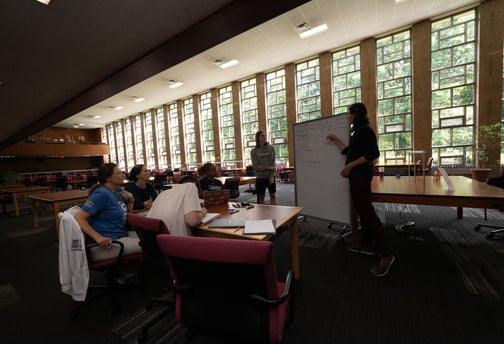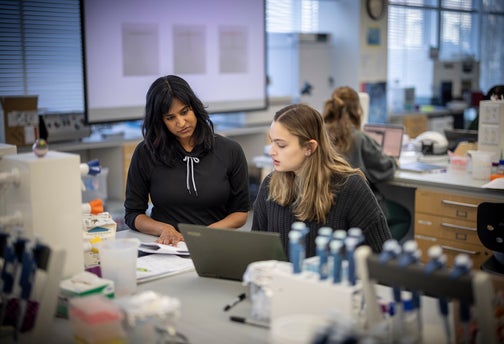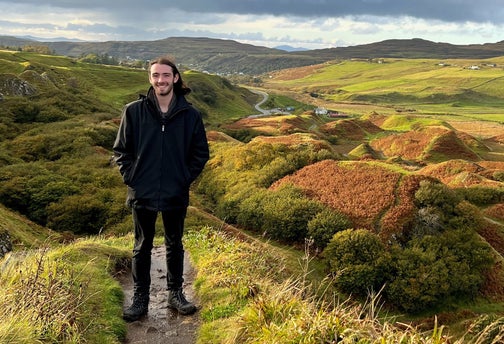When you think of life on Earth, you may only begin to comprehend the vast array of plants, animals, bacteria and other organisms that share this planet.
If you are interested in learning about the intricacies of life and living organisms, studying biology at Emmanuel opens a world of possibilities. Our distinguished faculty engage will engage with you through a rigorous academic curriculum, open doors through faculty-student research collaborations, and encourage the pursuit of advanced research and internship opportunities.
A First-Class Experience
Get to know the people and programs that will define your academic journey.
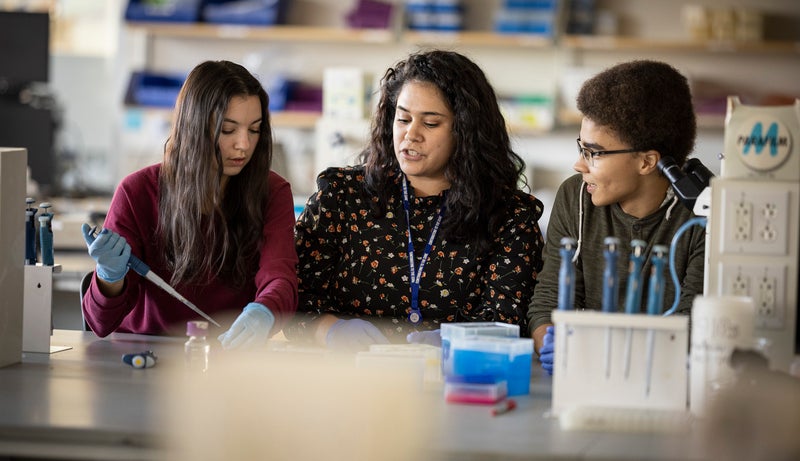
Cabrera Receives Nearly $450K from the NSD to Support Undergraduate Biology Research
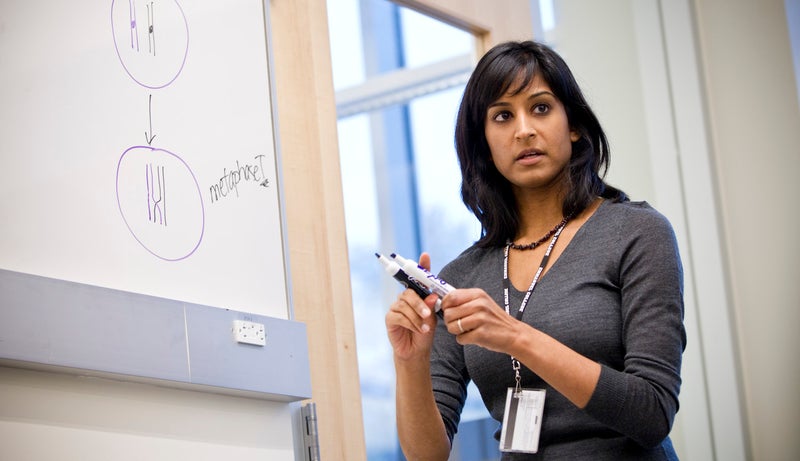
Meet the Faculty
Our distinguished faculty publish, exhibit and research. Present, compose and chair. Inspire and collaborate.
The Curriculum
View the 2023-2024 Academic Catalog to find course titles, numbers and descriptions.
Requirements for B.S. in Biology
- BIOL1105 Introduction to Cellular and Molecular Biology (SI-L) (NSL)
- BIOL1106 Introduction to Organismic and Evolutionary Biology (SI-L) (NSL)
- BIOL2123 Genetics
- BIOL2131 Biochemistry OR CHEM2111 Biochemistry with Lab
- BIOL2301 Experimental Biology Laboratory
- BIOL4160 Seminar
- CHEM1101 Principles of Chemistry I(SI-L)*+ AND
CHEM1102 Principles of Chemistry II(SI-L)*+ OR CHEM1103 Chemical Perspectives*+ - CHEM2101 Organic Chemistry I+
- BIOL4194/95 Research Internships in the Natural Sciences I & II OR INT3211 Experiential Internships in the Natural Sciences (with permission of instructor; a one-semester experience with approved research component
* Qualified students may replace CHEM1101 and CHEM1102 with CHEM1103
+Biology majors are approved to receive a passing grade of C- in CHEM1101, CHEM1102, CHEM1103, and CHEM2101
Electives:
Five biology electives, which include three with laboratory and two at the 3000-level, with or without a laboratory. Students must choose at least one from each of the two categories of biology electives. The remaining courses are chosen according to interest.
Category 1: Cellular/Molecular Electives
- BIOL2115 Determinants of Health and Disease
- BIOL2119 Current Topics in Biological Research
- BIOL2151 Marine Microbiology with Lab
- BIOL2303 Biotechnology Applications
- BIOL3101 Developmental Biology with Lab
- BIOL3103 Cell Biology with Lab
- BIOL3119 Immunology
- BIOL3125 Molecular Biology
- BIOL3127 Microbiology
- BIOL3132 Advanced Topics in Biochemistry
- BIOL3135 Cancer Biology
- BIOL4194/BIOL4195 Research Internships in the Natural Sciences I and II*
- CHEM3121 Introduction to Molecular Modeling
- NEURO3214 Psychopharmacology
Category 2: Organismic/Systems Electives
- BIOL2113 Human Nutrition
- BIOL2121 Human Health and the Environment (SJ)
- BIOL2135 Anatomy and Physiology I with lab
- BIOL2137 Anatomy and Physiology II with lab
- BIOL3101 Developmental Biology with lab
- BIOL3105 Endocrinology
- BIOL3151 Exercise Physiology with lab
- BIOL4194/BIOL4195 Research Internships in the Natural Sciences I and II*
- NEURO2201 Neurobiology
- NEURO3200 Computational Neuroscience
- NEURO3205 Neuroendocrinology
- NEURO3216 Neurobiology of Addiction
- NEURO3137 Medical Neuroscience
* BIOL4149 counts as a 3000-level biology laboratory elective for a B.S. in biology if the entire two-semester internship sequence (BIOL4194 and BIOL4195) is completed. The student's advisor determines the appropriate category for the internship. Students receive academic credit for the second internship course (BIOL4195), but it would not be counted as one of the 11 required biology courses.
View the 2023-2024 Academic Catalog to find course titles, numbers and descriptions.
Requirements for Minor in Biology
Five courses (no more than two at the 1000-level), such as:
- BIOL1105 Introduction to Cellular and Molecular Biology (SI-L) (NSL)
- BIOL1106 Introduction to Organismic and Evolutionary Biology (SI-L) (NSL)
- Any three biology courses except: INT3211, BIOL4160, BIOL4178, BIOL4194 and BIOL4195
At the completion of a degree from the Biology Department, the student will have:
- Master and apply fundamental concepts in biology.
- Source, critically evaluate and communicate scientific knowledge.
- Collaborate effectively with others to find insightful solutions to scientific questions.
- Apply ethical and moral reasoning to important biological issues that impact society.
- Acquire expertise in laboratory techniques, laboratory safety, experimental design, and data analyses.
- Explore career goals and experiential opportunities to excel in future professions.
Students seeking teacher licensure in biology must complete a major in biology, as well as complete required education courses and student teaching. Education requirements are available through the education department. Interested students should also consult the biology department regarding the optimal selection of electives.
Students seeking Initial Licensure in Massachusetts must pass the Massachusetts Tests for Educator Licensure (MTEL).
Where Essential Values and Skills Meet the Real World
Along with areas of knowledge and major requirements, you will cultivate essential values in the classroom and complete two courses in each area:
- Social Justice (SJ): Develop knowledge, skills, values and motivation to participate beneficially in activities of personal and public concern.
- Diversity & Multiculturalism (DM): Understand the complexity of identity the historical truths of different cultural perspectives to address bias and examine contemporary social issues.
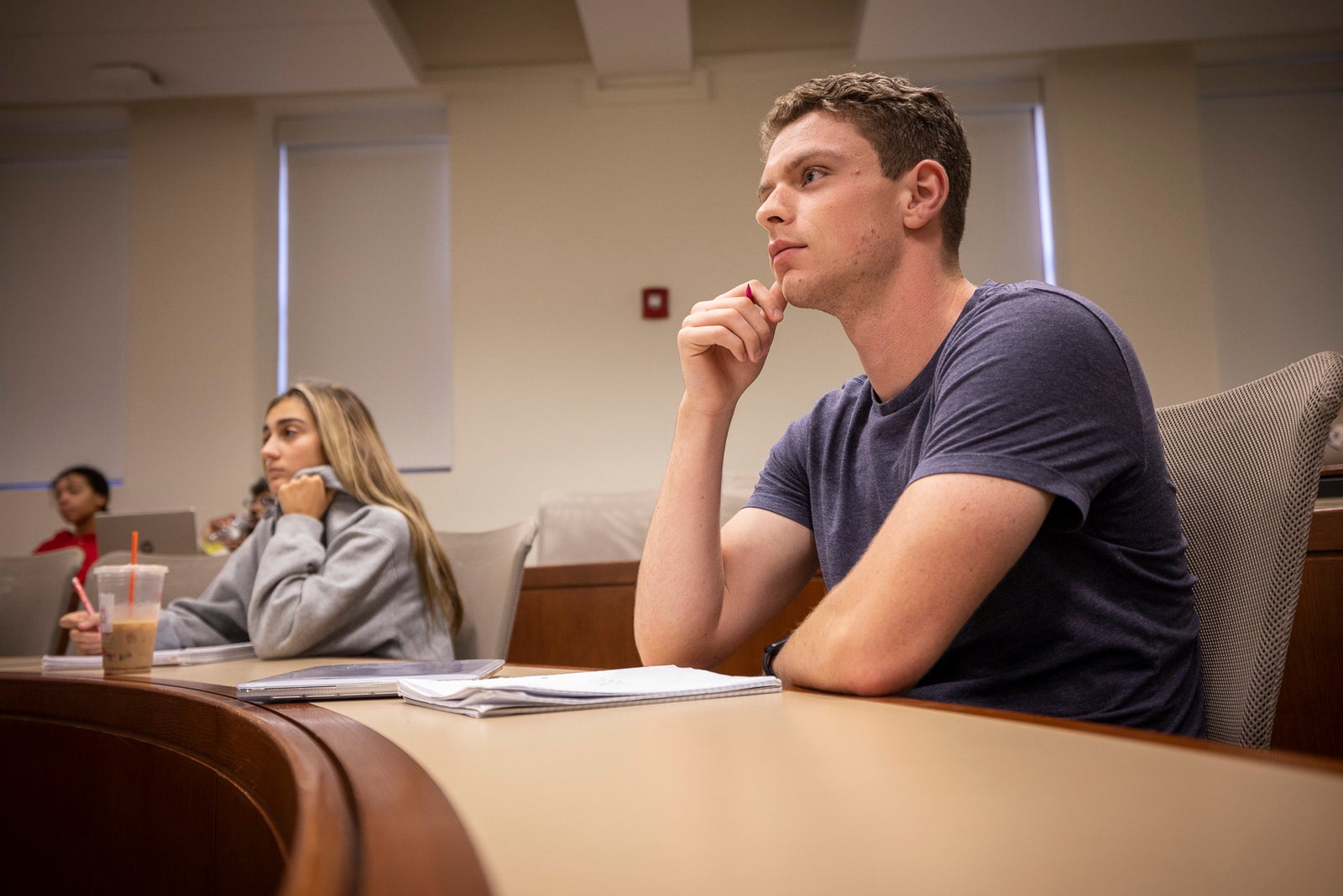
One hundred percent of Emmanuel students complete an internship as part of the core curriculum. In a city as dynamic as Boston, your options are bound only by the limits of your curiosity.
Students in the Biology department complete a range of research- and lab-based internships at area institutions such as Boston Children's Hospital, Dana-Farber Cancer Institute and Harvard Medical School, at Boston-based biotechnology companies such as Matrivax and Biogen, or alongside faculty on Emmanuel's campus.
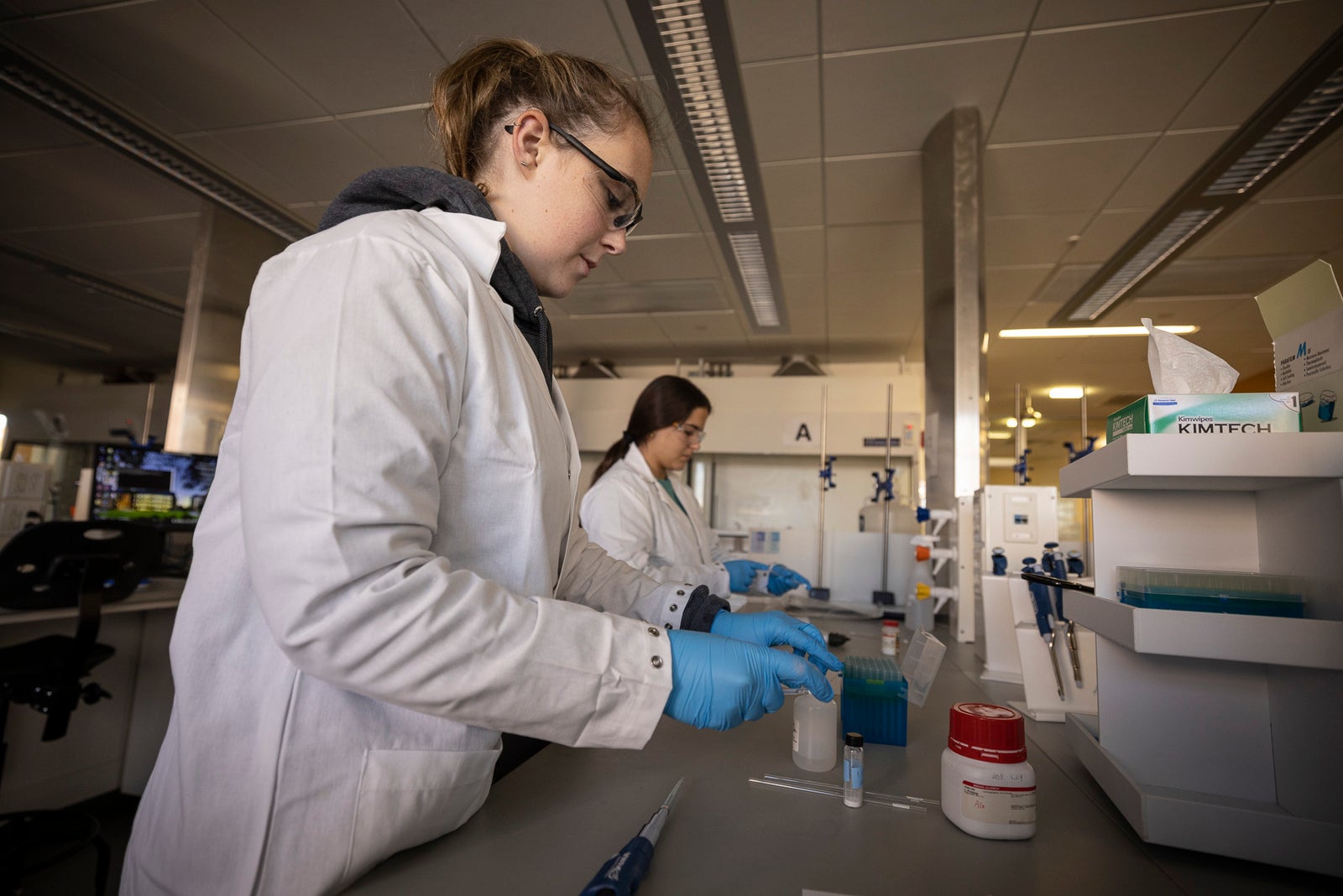
In all majors, the Capstone Experience involves completing a significant piece of work that requires the integration and application of learning from multiple courses.
As a biology student, you will discuss research on an advanced topic that integrates learning from previous courses (recent topics include the human microbiome, CRISPR and gene editing, macromolecular machines and the healthy brain). Aided with faculty and peer feedback, you will perform a literature review related to the focus of the class, formulate a hypothesis, and then craft, assemble and present an NSF-style grant.
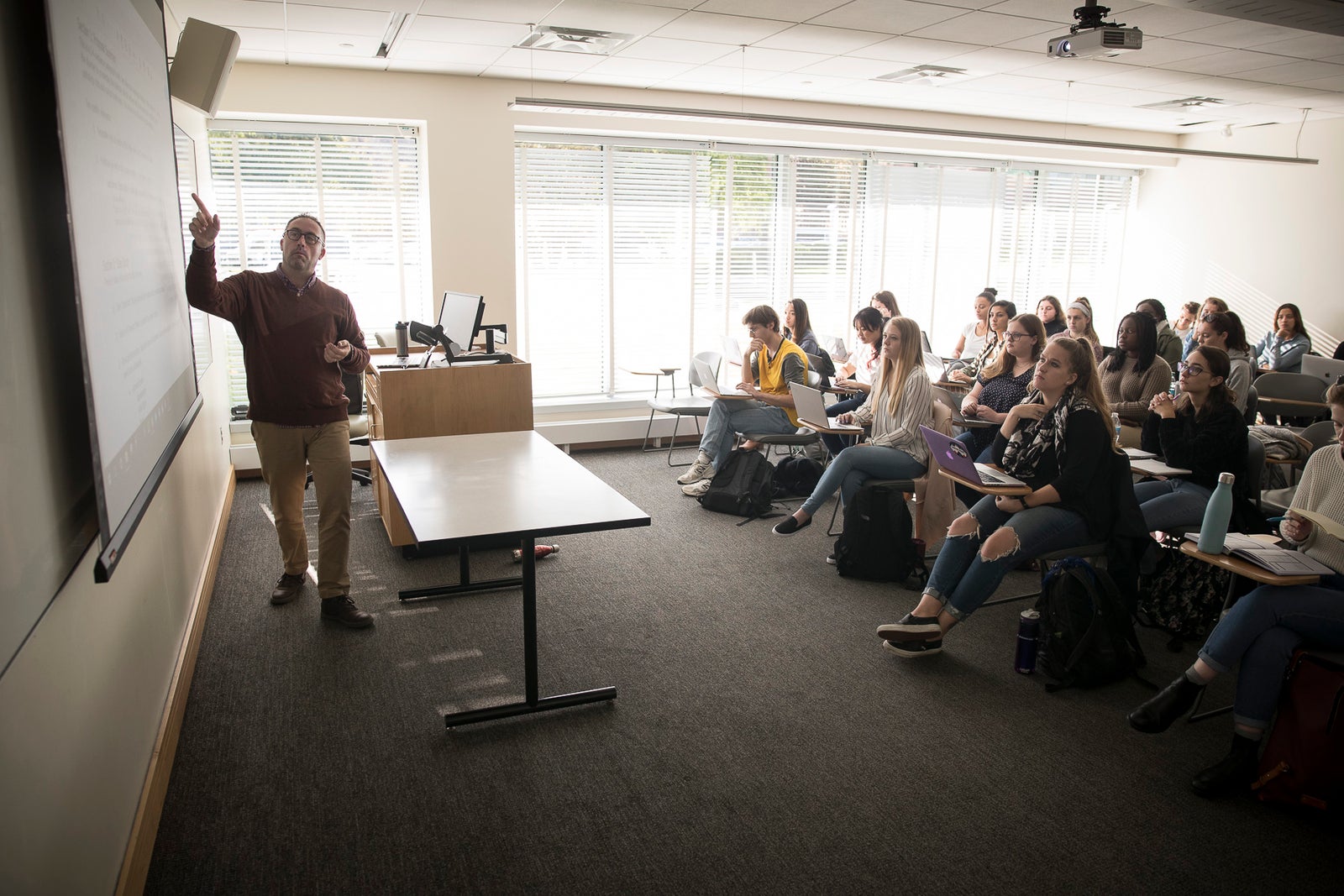
Science & Health Spotlight
See more news and stories related to the School of Science & Health
